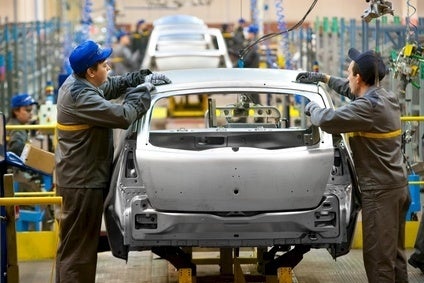
Renault Russia says it is looking to up the localised content of its vehicles to 80% as the fallout from the current political turmoil involving Moscow and Ukraine continues to take its toll on the rouble.
The issue has been thrown into sharp focus by increasing speculation Russia is mulling the imposition of sanctions on the Western automotive sector in retaliation for an increase in punitive measures from Brussels and Washington.

Discover B2B Marketing That Performs
Combine business intelligence and editorial excellence to reach engaged professionals across 36 leading media platforms.
“Nobody knows if it will be a small or big crisis,” said Renault Russia general director, Bruno Ancelin, at his Avtoframos plant in Moscow, although he insisted the Rouble’s troubles had started even before the current political upheaval.
“We want to enhance local content – minimise the impact of the Russian rouble.
“Here you can be the king if you localise. You pay tax to import cars from other countries – you pay roughly 30% import tax on the price. If you are localised, you pay almost nothing which is why Renault chose very high localistion.
“We benefit from state support because we are installed locally. The decrease of the Russian rouble is not linked to that [crisis] – it started before [mid-2013].”
Arcelin noted his plant was working closely at implementing synergies from the French automaker’s alliance with Nissan and its partnership with Russian manufacturer, AvtoVAZ, in which Paris and Yokohama hold a 50.1% controlling stake.
“In Russia, we must absolutely develop synergies with AvtoVAZ and Nissan – we need volumes,” said Ancelin. “We must give them hundreds of thousands of parts – it could only be done with a globalisation of the parts between the three – it is exactly the strategy of the alliance worldwide.
“Renault is the biggest investor in the Russian automotive industry – more than EUR1.5bn (US$2bn) [and] Moscow will continue to be at the forefront of our industrial strategy in Russia.
“Together with our partners, AvtoVAZ and Nissan/Renault target a common market share of 40%.
“In the agreements we signed with the government, we commit to localise 60% of content – the target for the future is to localise 80%. We are localising the powertrain in AvtoVAZ [for example].
Despite Renault’s bullishness concerning its ability to robustly withstand any economic impact through its high localisation, Ancelin nonetheless conceded the two economies of Russia and the European Union were highly dependent on one another.
“My forecast is everybody will act in order to make the situation more quiet, even if in the short term there could be happenings. If the market is continuing to decrease, I can’t exclude we have to take some [unspecified] measures.
“The market is very, very reactive to the announcement of countermeasures.”






